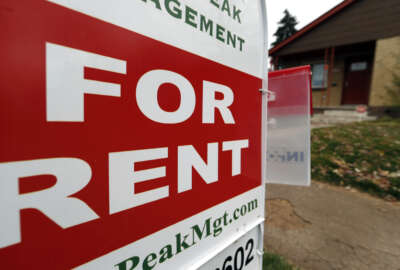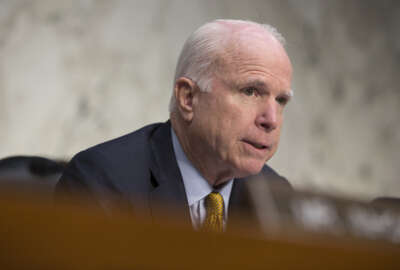
Air Force punches back at Senate plan to change military housing allowance
The Air Force's top enlisted officer is appealing to the Senate to reconsider its provision changing the Basic Allowance for Housing.
The Air Force’s top enlisted service member is taking issue with a congressional plan to change the way military housing allowance is doled out.
But the criticism comes as some of the lowest numbers of enlisted military service members are reporting financial difficulties.
The point of contention is a provision in the Senate version of the 2017 defense authorization bill. The provision changes Basic Allowance for Housing so that it only reimburses service members for their actual expenses instead of paying them a flat monthly payment.
“From my discussions with airmen around the world, I find that this proposal is having a significant negative impact on airmen’s morale and their sense of support from their elected officials,” a June 14 letter to Senate Armed Services Committee Chairman John McCain (R-Ariz.) signed by Air Force Chief Master Sgt. James Cody said. “Airmen are concerned about the potential financial hardships as some families could lose up to $50,000 a year in compensation. Additionally, this proposal threatens our wingman culture as it provides disincentives for shared living arrangements, thereby removing a critical support structure that contributes to the resiliency of the force.”
The Senate version of the bill would change the BAH in two different ways. First it would make service members provide proof of their rent and utility payments. The military would then only reimburse service members for what they actually spent, instead of giving them a flat fee and allowing them to keep the remainder.
The bill would also make it so that couples and service members who room together would not be able to receive two BAH stipends for one house. Instead, their individual stipends would be cut in half and then changed to cover the actual living cost.
Garry Hall, president and CEO of the Association of the United States Navy, said BAH is especially important for sailors because they are often stationed in areas such as San Diego, California, and Norfolk, Virginia, where housing is expensive due to accessibility to the water and local resorts.
Basic pay for an E-4 with four years in the military is about $2,600 a month. The average rent in San Diego County in March 2016 was $1,618, according to a report by Market Pointe Realty Advisors.
“These are high-dollar areas and without [BAH, sailors] couldn’t afford to live in those areas and scrape by,” Hall said.
But while there are some struggles, enlisted officers have been reporting better financial stability in the past few years.
A Defense Department report released last month on military community and family readiness stated a vast majority of junior enlisted service members felt financially comfortable or at least able to make ends meet without too much difficulty.
Chat with Jonathan Alboum, USDA CIO, July 26 at 2 p.m. Sign up here.
About 7 percent to 15 percent of junior enlisted officers felt uncomfortable in their financial situation in 2014 and between 10 percent and 25 percent of junior enlisted officers reported experiencing one or more bill payment problems in 2014.
That’s compared to between 20 percent and 30 percent feeling uncomfortable in their finances in 2002 and between 40 percent and 50 percent of junior enlisted service members experiencing payment problems in 2002.
Of course, those numbers only reflect the lowest paid members of the military and not higher paid service members.
Still, DoD is resisting even small changes to BAH, despite the possibilities for hundreds of millions of dollars.
DoD has already turned its nose up at a plan to lower BAH for dual military couples, even though an Army audit suggesting the department make the cuts to save about $300 million.
That plan would have changed the rules for dual military couples with children. Instead of giving both partners the with-dependent BAH rate, the audit suggested giving the with-dependent rate to one partner and the without-dependent rate to the other.
“While there would be some monetary savings in the BAH program achieved through implementation of a limitation of BAH payments for dual-military couples, the department objects to any limitation based solely on housing or marriage choices,” a DoD spokeswoman told Federal News Radio. “A recommendation that a member is less deserving of compensation, solely because of the member’s marital status, would impose a marriage penalty on married couples in which both members have volunteered to serve their country.”
There is a perception that households receiving two BAHs may be overcompensated, but the household income of a dual military couple is essentially equivalent to a family with one military member and one civilian employed member, the spokeswoman said.
Copyright © 2025 Federal News Network. All rights reserved. This website is not intended for users located within the European Economic Area.
Scott Maucione is a defense reporter for Federal News Network and reports on human capital, workforce and the Defense Department at-large.
Follow @smaucioneWFED




